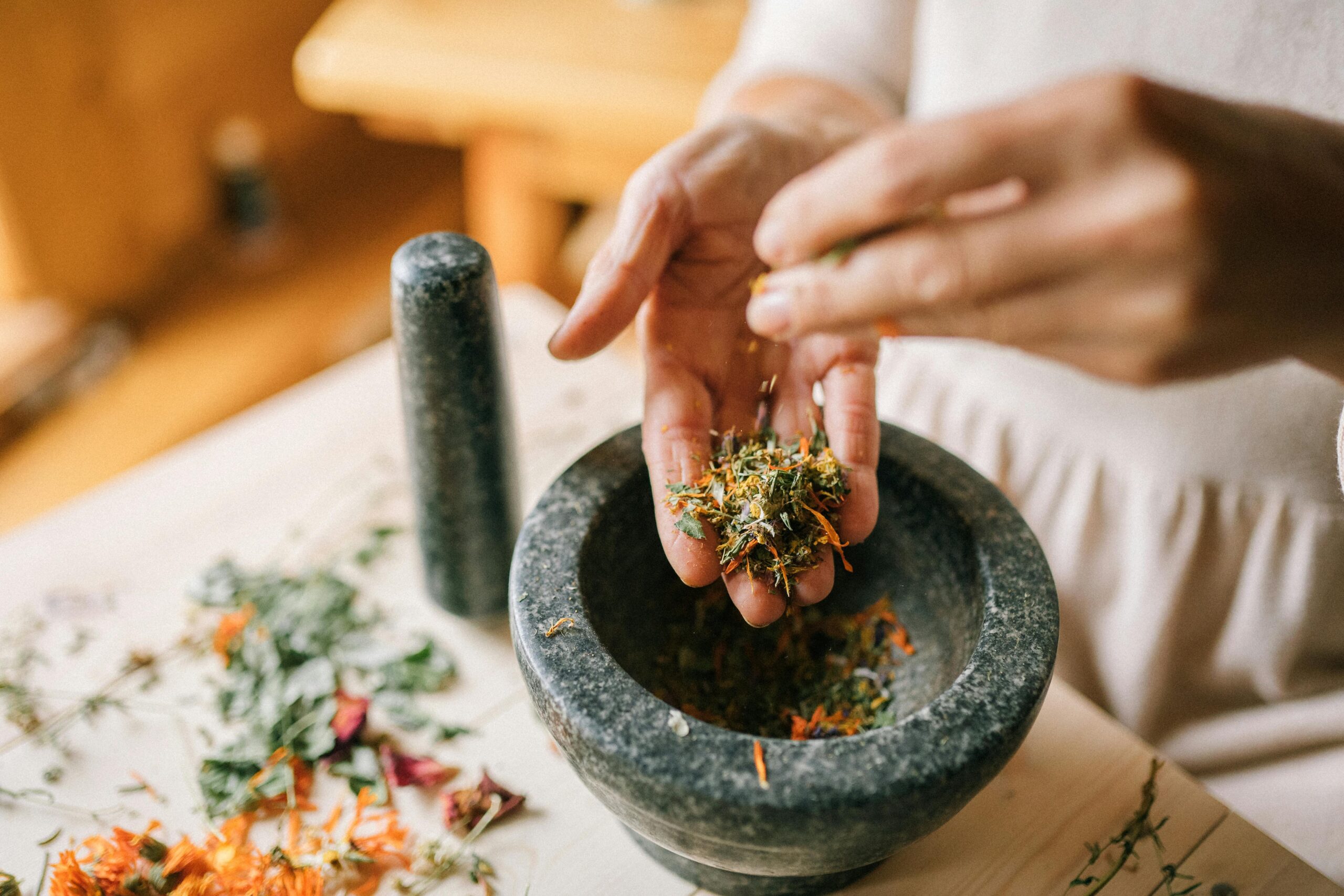The emergence of Generation Z as vocal proponents of traditional Chinese medicine (TCM) is unmistakably evident across various digital platforms. Short videos featuring demonstrations of the “Eight Brocades” exercise have amassed over 30 million views, accompanied by an impressive barrage of 33,000 comments. Moreover, the phenomenon of crowded massage departments in hospitals, predominantly filled with young individuals, has repeatedly surged to the top of trending topics.
Recognizing this burgeoning interest, many TCM clinics have introduced evening outpatient services, catering to the scheduling constraints of young professionals who can only seek medical attention after work hours. These trends, reflected in a multitude of news stories, underscore the undeniable emergence of Generation Z as ardent advocates for TCM.
Download our China’s F&B industry white paper
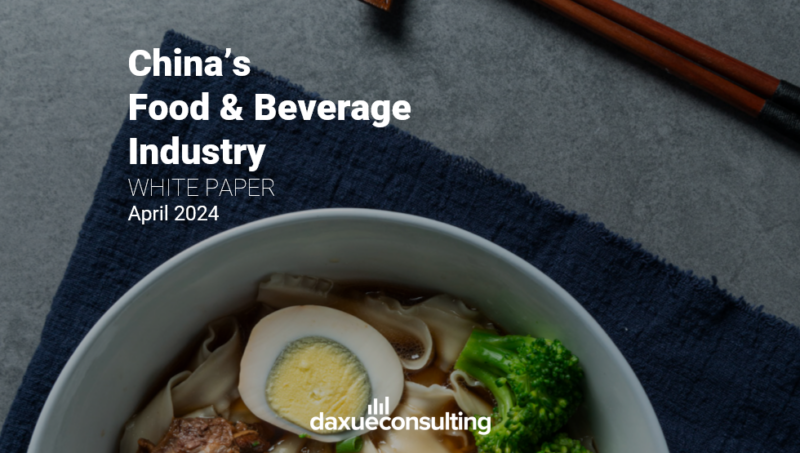
A short introduction to Traditional Chinese Medicine (TCM)
Traditional Chinese medicine, also known as oriental medicine, is a treasure of Chinese culture. A medical system has been used for thousands of years to prevent, diagnose, and treat disease. It is based on the belief that Qi (气) (the body’s life energy) flows along the meridians (channels) in the body, keeping a person’s mental, emotional, spiritual, and physical health in balance.
The purpose of TCM is to restore balance and harmony between the body’s natural opposing forces of yin and yang, which can block qi and cause disease. Traditional Chinese medicine shines in a wide range of fields, radiating into all aspects of people’s lives, including acupuncture, diet, herbal therapy, meditation, physical exercise, and massage.
Growing interest in TCM therapies among Gen Z
Compared to Western medicine, which primarily focuses on symptom relief, traditional Chinese medicine (TCM) emphasizes treating the root cause of illnesses, aiming to address the underlying issues comprehensively. Due to its minimal side effects and consistent efficacy, an increasing number of young individuals are opting to explore TCM clinics for body regulation. For instance, TCM can effectively address issues such as insufficient qi and blood, decreased immunity, and gastrointestinal problems, thereby facilitating daily health maintenance, disease prevention, and beauty care.
Gen Z’s enthusiasm for traditional Chinese medicine massage soars
Currently, numerous members of China’s Gen Z are showing interest in traditional Chinese medicine’s diagnostic and treatment techniques. Across various social platforms, massage departments within traditional Chinese medicine hospitals are quietly gaining popularity among young individuals. Shared content praising the comfort of TCM massage and highlighting the immediate relaxation experienced during treatments has garnered significant likes and comments.
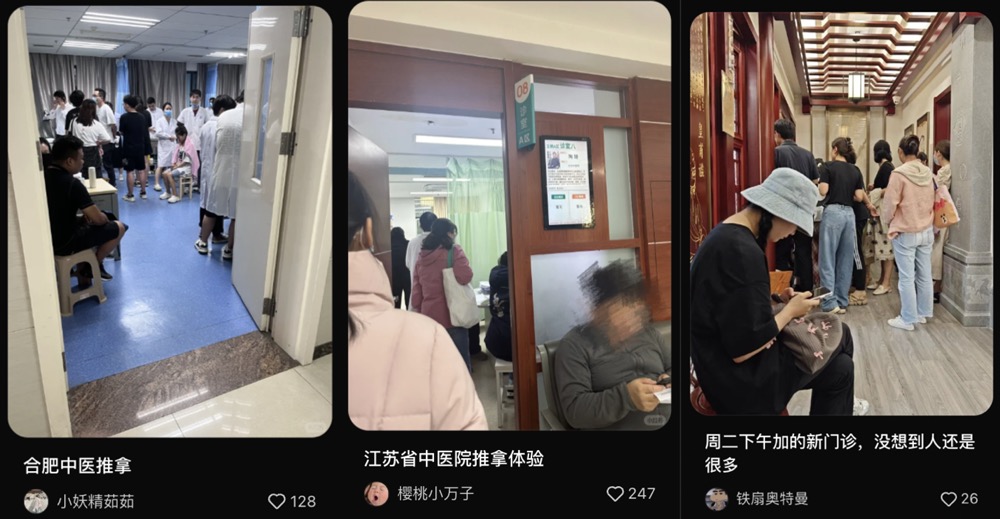
Qu Qing, an attending TCM physician at the Massage Department of Hangzhou Traditional Chinese Medicine Hospital, noted that during weekends, the department sees a surge in young visitors in their twenties and thirties, with the corridors bustling with activity. Advanced bookings are necessary to secure a massage appointment.
The fast-paced nature of contemporary social life, coupled with poor posture and lifestyle habits, has led to a demographic shift in ailments such as cervical spondylosis, originally associated with middle-aged and elderly individuals, now affecting younger populations, including adolescents. The increasing number of young patients born after 1995 seeking timely medical attention upon experiencing discomfort indicates a heightened awareness of health issues and a growing appreciation for traditional Chinese medicine culture.
Impact of entertainment media on shaping Gen Z’s interest in TCM
In addition to physical therapy, the release of popular internet dramas has also reflected Gen Z’s interest in traditional Chinese medicine culture, resulting in more Gen Z individuals becoming advocates for TCM. According to the latest data from the “China Better Life Survey,” in 2023, the top three consumption categories among young people aged 18-35 were travel (32.77%), digital products (31.67%), and healthcare (31.04%). On May 14, 2023, the drama ” Hòu Làng [后浪],” which focuses on the inheritance of traditional Chinese medicine culture and shapes the growth of young Chinese medicine practitioners, premiered exclusively on Youku.

Utilizing Generation Z’s enthusiasm for health and advocating for the public to adopt the correct lifestyle and attitude towards life were the original intentions behind ” Hòu Làng [后浪].” The series depicts the serene professionalism of seasoned Chinese medicine practitioners juxtaposed with the youthful vigor of their successors, showcasing the cultural ethos of mentorship and succession. It narrates the journey of Sun Toutou (portrayed by Zhao Lusi), a young woman in her twenties, who, under the guidance of Ren Xinzheng (portrayed by Wu Gang), a professor at the University of Traditional Chinese Medicine, embarks on the path of learning traditional Chinese medicine and inheriting her family’s legacy. As a member of Gen Z, Sun Toutou opens her heart and proactively embraces the study of Chinese medicine. Featuring renowned actors and a compelling script, this television series has piqued the interest of more Gen Z individuals in TCM.
The contradiction between belief in TCM and the actual purchasing behavior of Gen Z
According to our recent survey, an overwhelming majority of respondents expressed belief in food-related TCM concepts, a sentiment that transcended age, gender, city level, and income level. For example, most people believe that maintaining a balance of “hot” and “cold” foods is crucial. Generation Z has emerged as particularly staunch advocates of these traditional beliefs.
However, even though a staggering 67.6% of respondents believe in TCM principles and incorporate them into their daily lives, when scrutinizing the actual purchasing behavior regarding health foods, the presence of traditional Chinese medicine ingredients ranks as the least influential factor. This apparent contradiction can be elucidated through the lens of Guochao, which reflects the growing consumer preference for Chinese brands, traditions, and designs. For young Chinese consumers, embracing TCM beliefs may serve more as a means to express cultural confidence rather than dictating their dietary choices. Interestingly, skepticism about traditional Chinese medicine in food tends to increase with rising income levels.
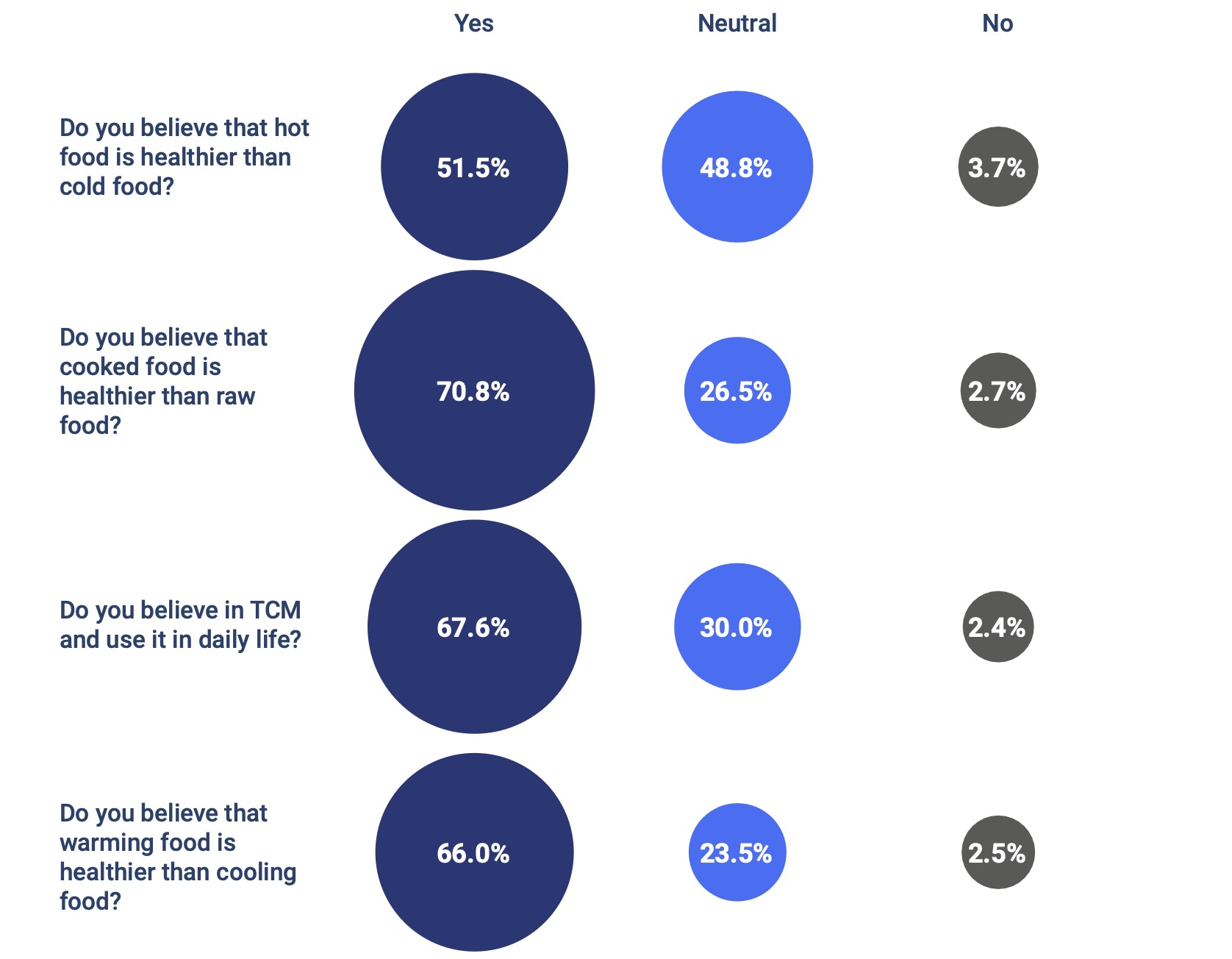
Consumption patterns in F&B of TCM-related products among Gen Z
As the popularity increases, with the rise of traditional Chinese medicine, many traditional Chinese medicine clinics have opened tea shops, providing innovative formulas combined with pharmacology. Many people on the Internet say that milk tea shops opened by traditional Chinese medicine centers are safer to drink.
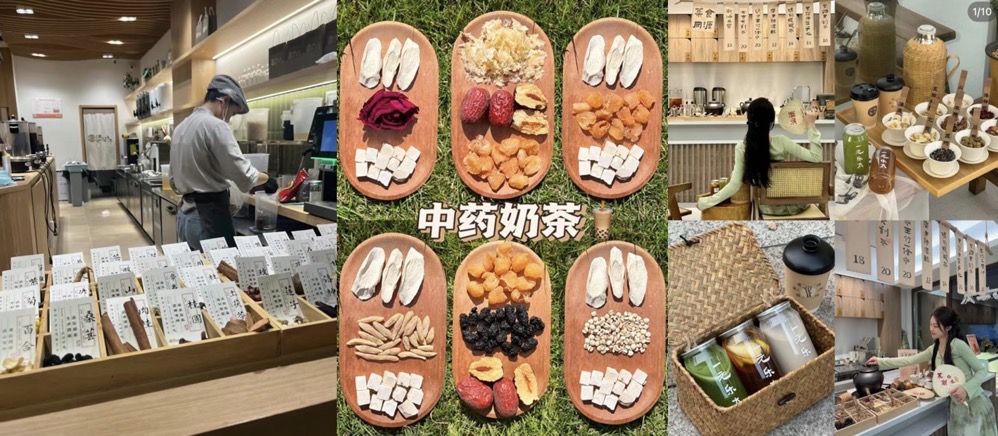
Not only that, but in daily life, people also choose to take some supplements for health care, and income has become a key factor affecting the choice of supplements. Vitamins A and C decrease as income increases. In contrast, collagen, lutein, omega-3, and royal jelly tend to be more expensive, and consumption increases as income increases.
Products combined with traditional Chinese medicine are very popular. For example, launched in 2022, the TCM energy drink “一整根熬夜水” (Whole root all-night elixir) made waves with its transparent bottle showcasing a genuine ginseng root. This innovative product targets aspirational white-collar consumers in top-tier cities, offering affordable ginseng-infused water. As of February 2024, the keyword “whole root” has been viewed approximately 3.2 million times on Xiaohongshu, demonstrating its online influence.
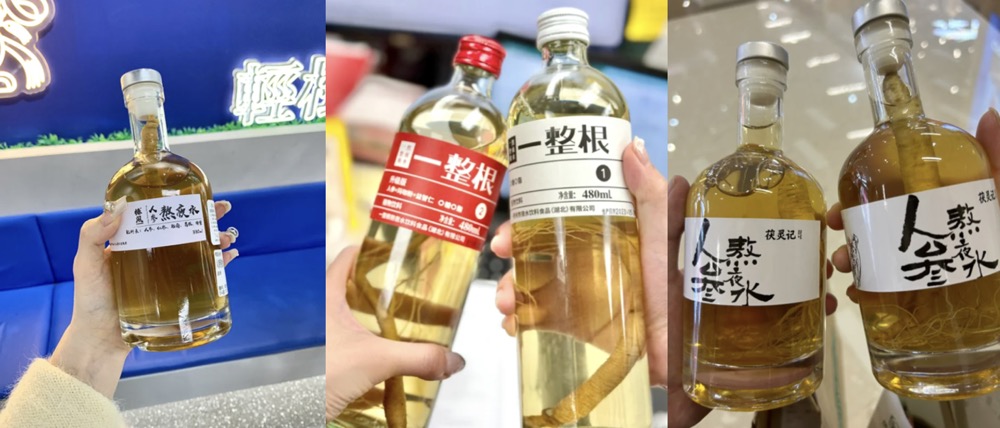
Is traditional Chinese medicine a fad or here to stay?
The growing popularity of TCM-infused foods and drinks is more than just a fleeting wellness craze. Among younger consumers, the appeal lies in the balance between convenience and cultural familiarity. They are drawn to the perceived benefits of Traditional Chinese Medicine, but without the bitter taste, complex preparation, or clinical overtones. Backed by the deep-rooted concept of “medicine and food homology” (药食同源), this movement integrates wellness into daily diets in ways that feel both authentic and accessible. Modern product innovations such as herbal teas and functional snacks have made it easier than ever for consumers to enjoy health maintenance on the go. With government support, including initiatives under the “Healthy China 2030” framework that promote TCM-based preventive care, this trend is well-positioned for long-term growth rather than short-lived novelty.
While it aligns with the broader narrative of cultural confidence (Guochao, 国潮), the current rise of TCM in consumer goods is primarily driven by state health policy and market pragmatism rather than sentiment alone. Regulatory frameworks, such as the National Health Commission’s expanding list of approved TCM ingredients, have ensured safety and accessibility, especially for an aging population. For younger generations, adopting TCM-inspired habits may symbolize a modern expression of wellness rooted in cultural identity, but the industry’s staying power rests on something deeper. By merging timeless traditions with contemporary lifestyles, TCM is evolving into a sustainable pillar of China’s wellness economy, bridging ancient philosophy with modern living.
How does Gen Z embrace TCM?
- The emergence of Generation Z as vocal proponents of traditional Chinese medicine (TCM) is clearly demonstrated by the significant engagement observed on various digital platforms.
- On the internet, TCM culture is experiencing a “secondary spread” through word-of-mouth, enabling more young individuals to deepen their understanding of TCM massage and physiotherapy.
- The surge in popularity of massage departments within TCM hospitals among young individuals further highlights Gen Z’s growing interest in TCM therapies.
- While a significant majority of respondents express belief in food-related Traditional Chinese Medicine (TCM) concepts, such as maintaining a balance of “hot” and “cold” foods, actual purchasing behavior among Generation Z reveals a disparity.
- These trends underscore the undeniable emergence of Generation Z as ardent advocates for TCM, shaping the landscape of healthcare consumption and cultural appreciation.



